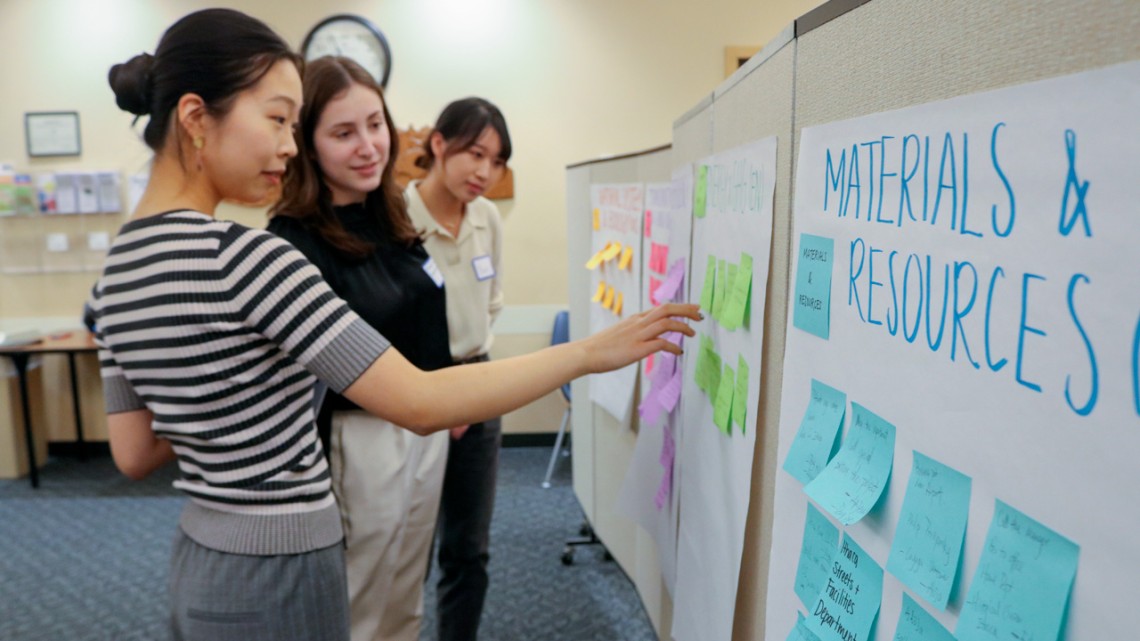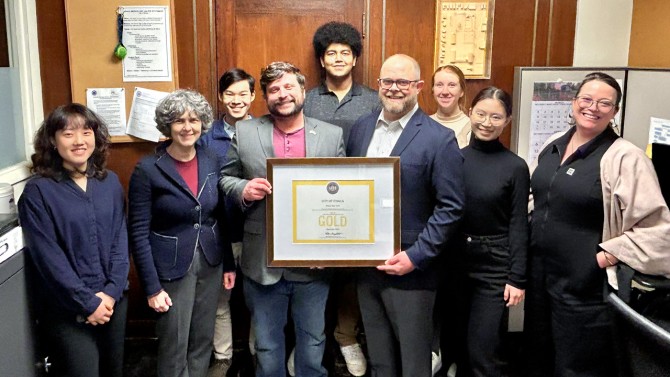
CUSD Sustainable City team members Isabella Zhi ’24 (left), Madeline Richmond, M.Eng. ’23 and Yuxi Wei, M.Eng. ’23 review notes at a March 2023 workshop at Tompkins County Public Library that brought together key stakeholders for the LEED certification project.
Students help city of Ithaca earn LEED Gold certification
By David Nutt, Cornell Chronicle
When the city of Ithaca received Leadership in Energy and Environmental Design (LEED) for Cities certification from the U.S. Green Building Council in March, one group of constituents was particularly gratified: the Cornell student team that helped the city earn the distinction.
Since fall 2022, the Cornell University Sustainable Design (CUSD) Sustainable City team worked with an array of municipal departments to assemble the extensive data needed to demonstrate that Ithaca met the stringent requirements for LEED certification – the world’s most widely used rating system for sustainable building practices.
Ithaca not only earned the certification – the city was certified Gold, the second-highest ranking, behind Platinum and ahead of Silver and Certified.
“Achieving LEED Gold was a surprise. But this whole thing is still a surprise to me, despite being on the team since the start of the project,” said Jiayi Guo ’26, a design and environmental analysis major in the College of Human Ecology, who co-leads the group. “We’re a student team, and we completed LEED certification. I did not expect, in my undergrad career, that this was something that could be achieved.”
Attaining Gold certification wasn’t easy. The process required a raft of detailed and specific documentation to earn credits in categories such as integrative planning, green spaces, energy and greenhouse gas emissions, transportation and land use, and water performance (all areas Ithaca excelled in), and others including green building policy and incentives, natural systems ecology, solid waste management and quality of life.
“The effort to submit for LEED certification might sound really simple, like we were just getting data and writing narratives explaining how we met those credits, but it’s a lot more complicated than that,” said Miranda Pickup, M.Eng. ’25, who joined the project last fall. “There were a lot of different areas that we needed to find data from, and there’s no central database for us to find that information. In a lot of situations, this data wasn’t publicly available.”
Understanding the LEED requirements and compiling and contextualizing the city’s data took time, persistence, many people and, perhaps most crucially, a holistic approach, according to Sirietta Simoncini, lecturer in Cornell Systems Engineering in Cornell Engineering, and the project’s advisor.
“The project was way more daunting than we thought it would be,” she said. “The data needed to be dug out and then interpreted very heavily, and then researched again and again. You need a transdisciplinary, resilient team.”
‘A broad look at how a city runs’
Simoncini has overseen a number of successful CUSD collaborations with the city of Ithaca and Tompkins County. Two years ago, the CUSD Sustainable City team completed a five-year project to redesign the signage system in Ithaca’s Seneca Street Parking Garage, and another team that she advises – CUSD Sustainable Mobility – designed bus stop signs for Tompkins Consolidated Area Transit that were installed in 2018.
At the end of spring 2022, Simoncini was approached about the LEED certification project by one of her frequent collaborators, Sean O’Brien, who at the time was the chairman of the U.S. Green Building Council (USGBC) New York Upstate and is a senior project manager for the architecture and engineering firm Tetra Tech, which also assisted with the effort.
The project was a natural fit for a CUSD team, of which there are currently 12, tackling everything from aquaculture to refurbishing solar panels. Over the last 2 ½ years, more than 60 students participated in the Sustainable City team from many different disciplines: design environmental analysis, civil engineering, computer science, information science, architecture, regional planning and agricultural sciences.
There are also graduate students like Pickup, who are fulfilling a requirement for the master’s degree (M.Eng.) in the systems engineering program.
“It’s a win-win. We’re doing something in the real world while also earning our educational credit at the same time. So that’s awesome,” said Pickup, a distance-learning student in the systems engineering program, who is based in Philadelphia and works in the aerospace industry. “From an industry perspective, I understand how much time a project like this can take, especially for the city of Ithaca. A project like this isn’t necessarily predefined in their budget or their scope of work.”
LEED certification is essentially “a really, really broad look at how a city runs,” according to Savannah Vega, sustainability planner in the city of Ithaca’s Office of Sustainability, and it touches upon almost every municipal department. Waste management, energy, water sources, engineering, transportation and planning: All play an integral part in assessing a city’s sustainable practices. And all contain voluminous data in different places and formats that need to meet the LEED specifications.
“It’s something that definitely has very specific requirements, certain specific documents that are needed that may live somewhere at the city but finding them can be a large time suck,” Vega said.
Vega worked with the students as they hunted down data, connected them with other city offices and helped review and submit their materials to USGBC.
“This is really a new model of how to apply for LEED certification. Most of the time, cities don’t collaborate with university students to be able to build out the application. It was a trial-and-error project for us, but it really made it so that we were able to have the capacity to apply for this program without straining our resources,” said Vega, who noted that the Office of Sustainability is a team of two. “Any kind of project that we take on, we have to really weigh the pros and cons of making sure that we are balancing our time.”
While certifications can be a great way to showcase what the community has accomplished, the city needs to prioritize new programs, too. “This really helped us do both at the same time without having to sacrifice anything,” Vega said.
The team members spent the early phase of the project familiarizing themselves with the LEED framework and – with help from the Office of Sustainability – learning to navigate city government. With so many students working on the project, so much information being sought and so many departments involved, it was difficult to get everyone on the same page. So the team came up with a practical solution: They got everyone into the same room.
In March 2023, the students held a workshop at Tompkins County Public Library that brought together all the key stakeholders and enabled them to connect in person. It also gave the students an opportunity to fill in the gaps of their data collection.
“It was a great experience to learn about what it is like to be in Ithaca and who are the different people who contribute to this whole city system to make it work,” said Guo.
Each student researched a particular LEED credit that was being pursued, then met with different stakeholders in “speed dating”-like breakout sessions.
“At each table, we had five or 10 minutes to go through a pre-prepared list of information that we want. ‘Do you know where we can get those? Or can you provide a point of contact if you don’t have this information, but someone else might?’” Guo said. “It was really fun, and we got to introduce them to the LEED framework. Everyone was on board.”
The team tracked down and processed the new data, then submitted a preliminary application to USGBC the following fall. But it wasn’t enough. They came up short of the necessary credits for certification.
“That’s where, for me, the interesting part starts because I always teach my students that the failures are good, as long as you do something about it,” Simoncini said. “We learned about what categories we failed. For some of the categories, it wasn’t anybody’s fault. It was about not adding enough data, or having the wrong data, or simply not reaching the quorum that was required. And so we worked harder.”
‘We did it … and we can keep working on it’
Guided by USGBC’s feedback, the students embarked on a new round of data-gathering. The team sent the final submission in November 2024 and within a few weeks they learned the city had achieved Gold certification by scoring 60 out of a possible 110 points.
“I worked with the students to get the application ready. They did an amazing job,” Vega said. “When we resubmitted, we achieved almost every point that we applied for. So I think that just shows the dedication and attention to detail that the students came into the project with. I was very impressed.”
Certification didn’t signal the end of the project, however. Guo, Pickup and several other students are putting together a report to provide insights on Ithaca’s LEED performance to help city officials, developers, architects, designers, planners – even other communities – better understand the certification process as well as Ithaca’s sustainability strengths and opportunities for improvement.
“A certificate is a great thing to put on a shelf or a wall,” said Simoncini, who is already using the team’s findings to inform a new project she is advising – the development of Ithaca’s Cherry Street district. “But it’s not just about receiving a certification. The report is a reflection on how well we’re doing as a city in terms of sustainability, and how we can do better. That’s also very important.”
There was an additional benefit to the LEED certification project: It encouraged the team to learn more about the place where they reside.
“As a student, but also someone who’s currently living in Ithaca, it’s very important that we know about the city outside of our campus buildings,” Guo said. “That has been really, really valuable to me – to be able to see the city through different lenses.”
Media Contact
Get Cornell news delivered right to your inbox.
Subscribe


